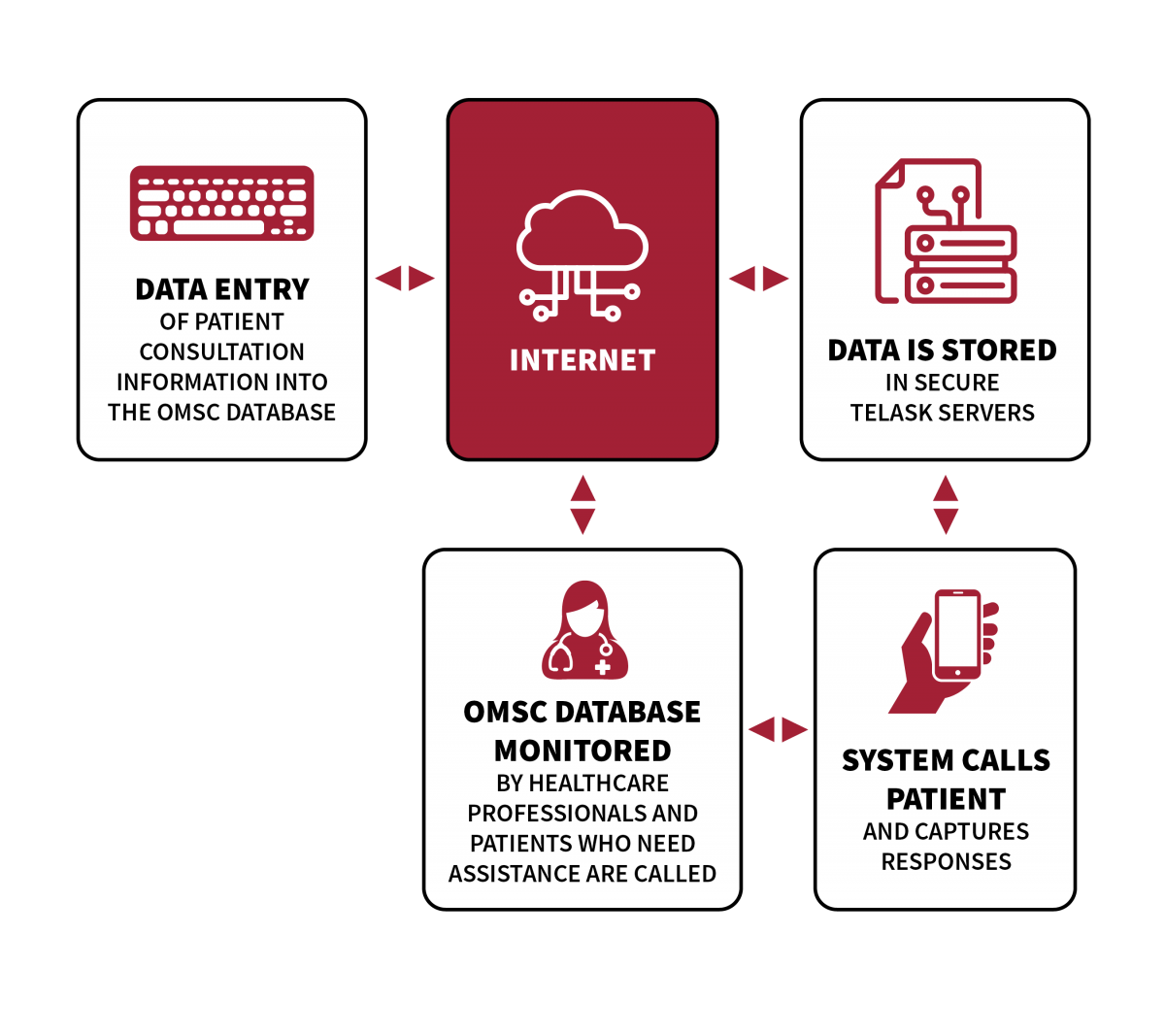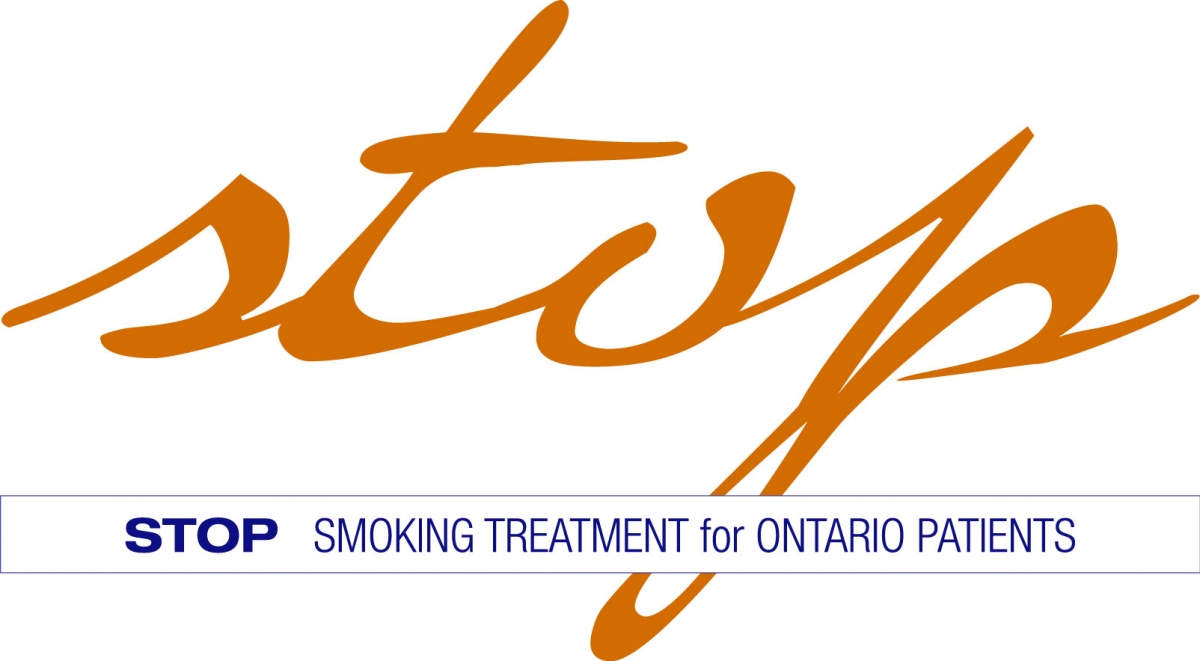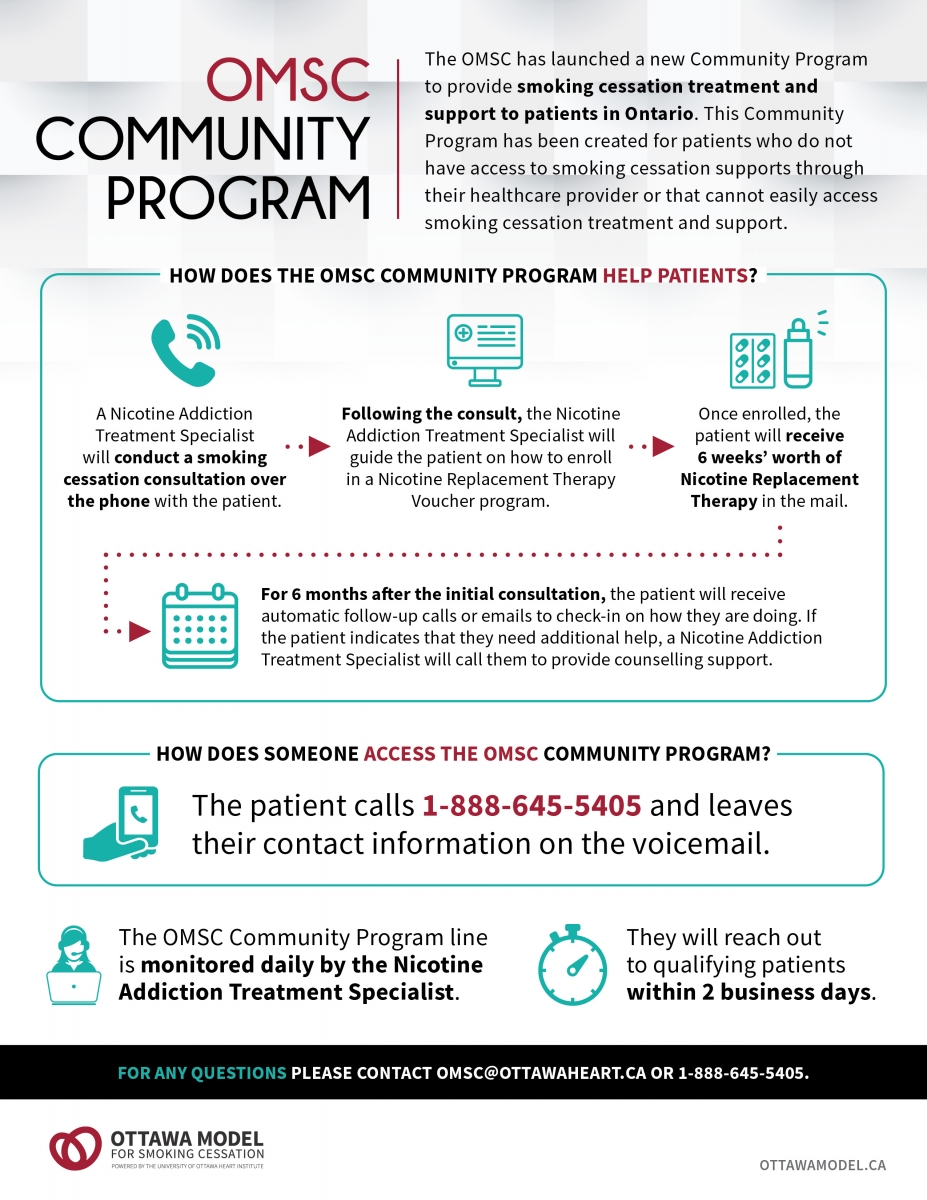The Ottawa Model for Smoking Cessation (OMSC) team facilitates practice change by offering the following products and services to our partnered sites:
Implementation Specialist Support
 Implementation Specialist support is key to the adoption and sustainability of clinical smoking cessation programs. The OMSC approach uses Implementation Specialists to deploy evidence-based smoking cessation systems of care across a spectrum of clinical environments. OMSC Implementation Specialists not only assist in training staff and implementing the OMSC, they serve as consultants for troubleshooting, devising clinical protocols, providing progress reports, and completing program evaluation.
Implementation Specialist support is key to the adoption and sustainability of clinical smoking cessation programs. The OMSC approach uses Implementation Specialists to deploy evidence-based smoking cessation systems of care across a spectrum of clinical environments. OMSC Implementation Specialists not only assist in training staff and implementing the OMSC, they serve as consultants for troubleshooting, devising clinical protocols, providing progress reports, and completing program evaluation.
OMSC Implementation Workplan
 In order to bring about practice change, OMSC Implementation Specialists work with partner sites to adapt and implement clinical practices using a detailed OMSC Implementation Workplan. The OMSC Implementation Workplan is comprised of six phases of step-by-step instructions for planning, implementing, evaluating, and sustaining an evidence-based clinical smoking cessation program.
In order to bring about practice change, OMSC Implementation Specialists work with partner sites to adapt and implement clinical practices using a detailed OMSC Implementation Workplan. The OMSC Implementation Workplan is comprised of six phases of step-by-step instructions for planning, implementing, evaluating, and sustaining an evidence-based clinical smoking cessation program.
OMSC patient and provider tools have been developed to support the integration of best practices for smoking cessation into various clinical settings. The OMSC team works with partners to customize these tools to meet their specific needs and requirements.

Contact omsc@ottawaheart.ca if interested in learning more about our OMSC Tools and Resources.
The OMSC provides various types of clinical and practice change training for partner sites, including:
- OMSC workshops
- Staff and physician training, when available (CME accreditation may be available)
- e-Learning modules
- Annual Ottawa Conference: State of the Art Clinical Approaches to Smoking Cessation
OMSC Database
The OMSC Database has two essential functions which makes it a revolutionary approach to the care and treatment of smokers:
- Provision of patient follow-up
- Performance tracking and program evaluation
Patient Follow-up
The OMSC Database (TelASK Technologies Inc.) provides automated follow-up to keep in touch with and support patients who smoke after a hospitalization or clinic visit. Patients are offered up to nine automated calls or e-mails over a two to six-month period to monitor how they are doing with regard to quitting smoking. The system acts as a triage tool and flags patients who indicate during their automated call that they are in need of a call from a cessation specialist for additional counseling.

"I've been smoking since I was 12 years old and have had 4 or 5 attempts to quit smoking. This time it was different because they call you and that's really what I needed. They listened to me and talked to me."
- Patient, Horizon Health Network, New Brunswick
Performance Tracking and Program Evaluation
As the requirement to evaluate healthcare programs becomes the norm and not the exception, the OMSC Database is leading the way in program evaluation and performance tracking. The OMSC Database can provide partnered sites the ability to track program performance indicators, such as the number of patients provided with a smoking cessation consultation; and the number of smokers who have quit or reduced smoking.

Whenever possible, the OMSC process is integrated with the electronic medical record (EMR). Data from the EMR can be routinely uploaded into the OMSC Database, facilitating patient follow-up and program evaluation. In Ontario, several EMR vendors have altered their system to integrate OMSC provider tools including provider flags to prompt the screening of smoking status of patients at regular intervals.
STOP Program
 Many OMSC partner sites are also working with the Centre for Addiction and Mental Health's STOP program which uses the latest technology and methods to scale up patient-centered tobacco addiction treatment including access to cost-free nicotine replacement therapy, coaching of clinicians, and continuous improvement. Healthcare practitioners also receive ongoing training opportunities in partnership with both the OMSC and STOP programs in order to enhance the quality of smoking cessation services delivered to patients.
Many OMSC partner sites are also working with the Centre for Addiction and Mental Health's STOP program which uses the latest technology and methods to scale up patient-centered tobacco addiction treatment including access to cost-free nicotine replacement therapy, coaching of clinicians, and continuous improvement. Healthcare practitioners also receive ongoing training opportunities in partnership with both the OMSC and STOP programs in order to enhance the quality of smoking cessation services delivered to patients.

_
